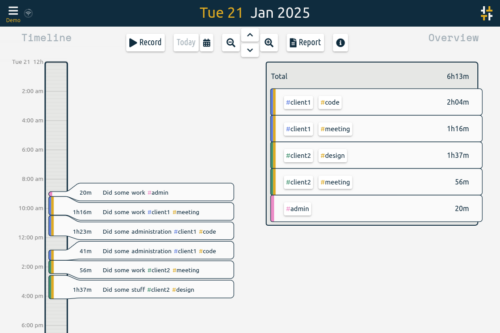Time tagger

An open source time-tracker with an interactive user experience and powerful reporting.


An open source time-tracker with an interactive user experience and powerful reporting.
ActivityWatch is an app that automatically tracks how you spend time on your devices.
It is open source, privacy-first, cross-platform, and a great alternative to services like RescueTime, ManicTime, and WakaTime.
It can be used to keep track of your productivity, time spent on different projects, bad screen habits, or just to understand how you spend your time.
There are six steps in the original technique:
Decide on the task to be done.
Set the pomodoro timer (traditionally to 25 minutes).
Work on the task.
End work when the timer rings and put a checkmark on a piece of paper.
If you have fewer than four checkmarks, take a short break (3–5 minutes), then go to step 2.
After four pomodoros, take a longer break (15–30 minutes), reset your checkmark count to zero, then go to step 1.
For the purposes of the technique, a pomodoro is the interval of time spent working.
Kimai is a free & open source timetracker. It tracks work time and prints out a summary of your activities on demand. Yearly, monthly, daily, by customer, by project … It’s simplicity is its strength. Due to Kimai’s browser based interface it runs cross-platform, even on your mobile device.
Kimai v2 is a web-based multiuser time-tracking application. Free for everyone: freelancers, agencies and companies track their employee working-times and generate invoices.
Kimai is a simplistic time-tracker that keeps record of your time and prints out your results when you need them. The tool works great for those who need a simple solution without any extra features: in it, you can record time in multi-user mode, manage customer and project data, run reports, and export timesheet data.
No database setup is required for installing the app – it has database support out-of-the-box. The new version of Kimai is based on the newest technologies and has a JSON API for setting up integration with other applications.
I was in a similar situation back in 2012. I really wanted to understand how my employees were spending their time. Were they focusing on tasks of the highest priority? How much time did it take them to find solutions? How close were we to achieving our goals? Were the projects I assigned progressing at the right pace? Could I optimize and streamline some of my teams? Do my team goals align with my final goal? It was an endless line of questions all begging just for one solution: A productivity management application.